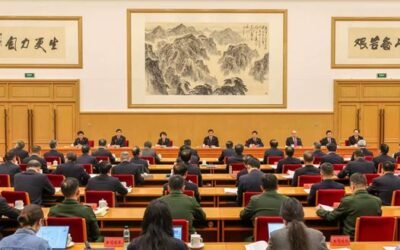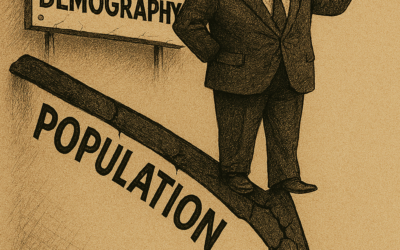Though native to China, Taoism has also become a target of the anti-religion campaign: places of worship closed and converted, traditional temple fairs prohibited.
Li Mingxuan
Under President Xi Jinping’s policy to severely crack down on religion, Taoism – one of the traditional Chinese Three Teachings, along with Buddhism and Confucianism – has also been unable to escape persecution. Even statues of Laozi, considered the founder of Taoism, have been forcibly demolished or hidden from view.
Temples prohibited from holding religious activities
China’s eastern province of Shandong has strong ties with Taoism: one its branches, the Quanzhen School, was founded there in the 12th century. Despite this historical connection, under the CCP’s campaign to suppress religion, local Taoist temples in the province are continually coming under attack.
In January, the Religious Affairs Bureau of Lanling county, under the jurisdiction of Linyi city, prohibited Jade Emperor Palace, a Taoist temple, from holding religious activities on the grounds of “not having a religious activity venue registration certificate.”
Officials claimed that the government is currently cracking down on all religions, and prohibited the temple’s owner, who is in his 70s, from carrying out any religious activities and promoting Taoism to tourists. He was told not to allow anyone to come in into the temple without prior permission from authorities. “If you dare acting against the state’s orders, not only will the temple be demolished, but you will also be arrested and imprisoned,” threatened the officials.

The signboard of Jade Emperor Palace has been demolished.
A Taoist priest in the area revealed that in 2017, the local government built a new “Traditional Culture Association Institute” next to Jade Emperor Palace and forbidden the public to visit the temple, planning to convert the temple into an academy and merge it with the institute.
According to a Taoist priest, in April, the institute started offering classes taught by history and political science teachers from colleges. The content of lectures doesn’t have anything to do with religion; it mostly includes topics like the core socialist values, science, traditional culture, laws and regulations, and alike. The institute is also planning to organize lectures at Jade Emperor Palace.
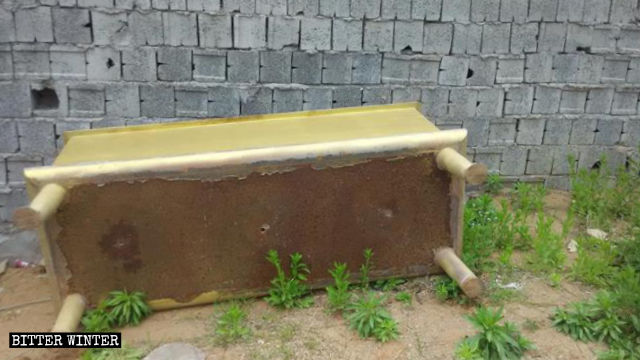
The abandoned small incense burner inside Jade Emperor Palace.
In early May, the county’s Religious Affairs Bureau forcibly removed the signboard with the temple’s name above the door of the main hall. Inside the temple, the large incense burner was sealed off with sheets of galvanized iron, and statues of deities were blocked off with wooden boards, traditional culture propaganda slogans posted on them.
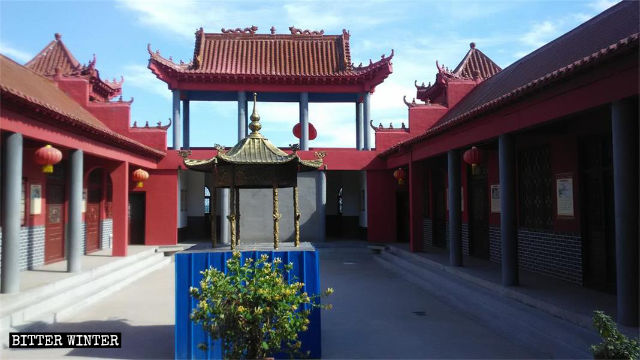
The large incense burner inside Jade Emperor Palace was sealed off with sheets of galvanized iron.
“The government doesn’t allow to carry out Taoist religious activities. The conversion of the temple into an academy is one of the CCP’s ways to indoctrinate people with the Party’s ideology,” a local Taoist believer said.

Deity statues inside Bixia Palace were covered with wooden planks.
Bixia Palace – a Taoist temple located in Xiying town, in Nanshan district of Ji’nan city – was shut down on April 29, on the grounds that it was “unlicensed.” The temple’s priests were expelled, and statues inside were hidden from view. Instead of the temple’s name, the signboard now reads “Filial Piety and Virtue Lecture Hall.”

The signboard of Bixia Palace has been changed into “Filial Piety and Virtue Lecture Hall.” Taoist sayings on either side of the entrance were replaced, leaving them devoid of any Taoist characteristics.
Over in Xintai city, Bixia Yuanjun Temple was forcibly converted into a cultural center, and propaganda slogans “Study and promote the Party’s 19th National Congress,” “Don’t forget your initial intention,” and “Follow the Party” were posted inside.
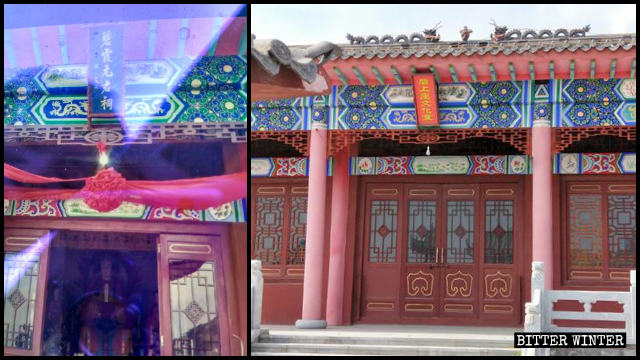
Bixia Yuanjun Temple was converted into a cultural center.

The Party’s political propaganda slogans were posted inside Bixia Yuanjun Temple.
Temple fairs banned
In the northern province of Hebei, nine Taoist temples have been built on a mountain in Sanquzhuang village, located in Tang county, under the jurisdiction of Baoding city. Every year in February, the temples hold fairs and invite Taoist masters to preach about Taoist culture. This year, however, the local authorities canceled the event, claiming that these temples were “unlicensed.”
“We’re promoting our own religion, but the CCP still interferes. There is no freedom of belief at all!” a Taoist priest said angrily. “Last year, the state implemented religious reform. All our credentials were revoked. If we were to re-apply now, it would cost too much. We simply can’t afford it. But if we don’t apply, we won’t be allowed to be priests.”
In March, all the roads leading to the temples were blocked off, and pilgrims were prohibited from coming to burn incense and listen to sermons. As a result, the priests lost their source of livelihood and were forced to descend the mountain to beg for alms.
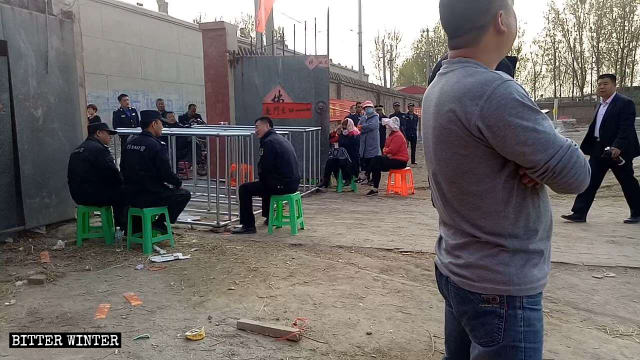
Police set up iron railings in front of Gulingshan Temple’s entrance, prohibiting people from holding religious activities.
At the same time, temple fairs were also banned at Gulingshan Temple in Wan’an town of Li county, under the jurisdiction of Baoding city. The local government dispatched more than 40 personnel, set up iron railings in front of the temple’s entrance, installed surveillance cameras in the surrounding area, and prohibited people from burning incense.

Police stand guard in front of Gulingshan Temple.

Uses a pseudonym for security reasons.

